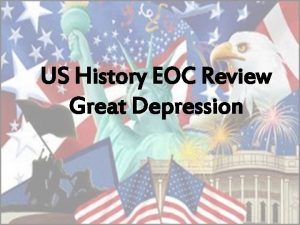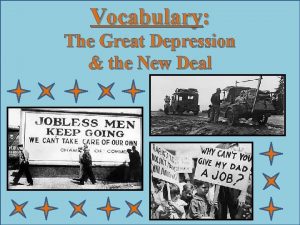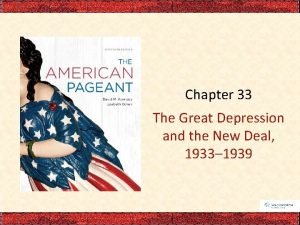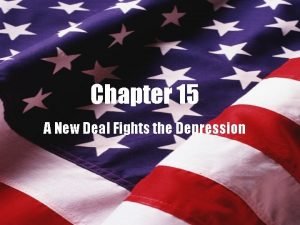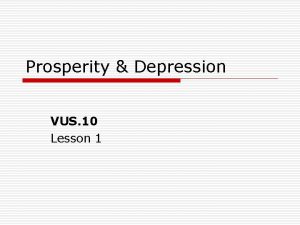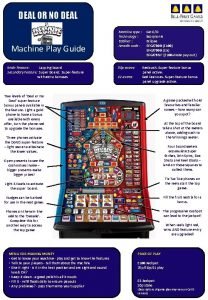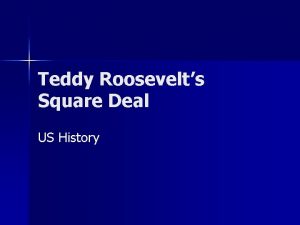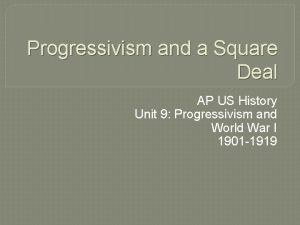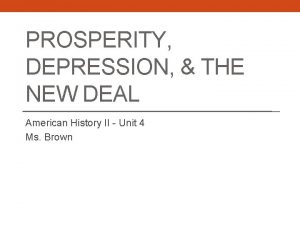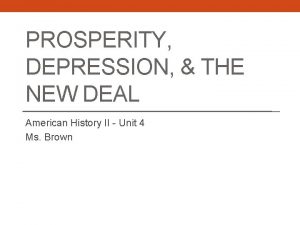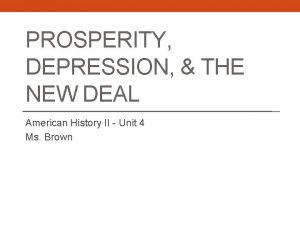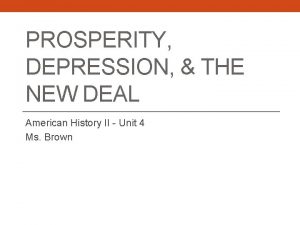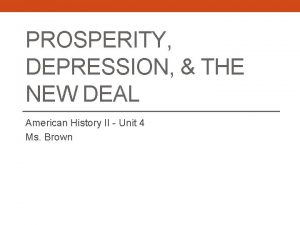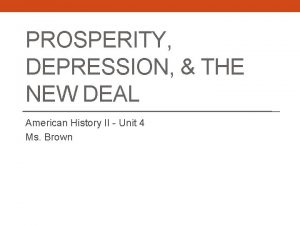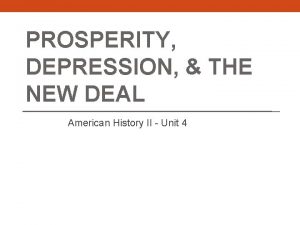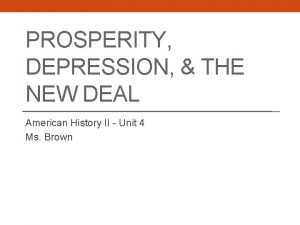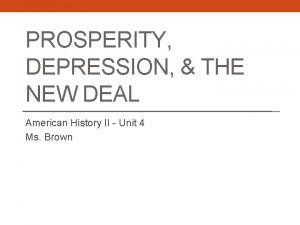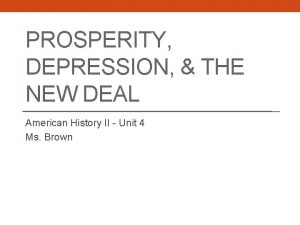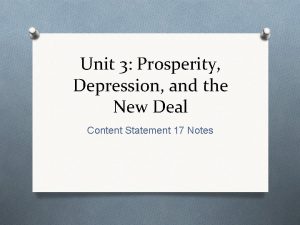PROSPERITY DEPRESSION THE NEW DEAL American History II















- Slides: 15

PROSPERITY, DEPRESSION, & THE NEW DEAL American History II - Unit 4

EFFECTS OF THE NEW DEAL Unit 4. 10 Mr. Duncan

Women • Women in Government • Frances Perkins – first female cabinet member (major role in Social Security Act and supervising labor legislation) • Eleanor Roosevelt - encouraged FDR to appoint women to positions which would hopefully garner the female vote → 2 female diplomats and 1 female federal judge

Women • Women in the Workplace • Faced discrimination from men seeking jobs → 1936 Gallup poll showed 82% of Americans said a wife should not work if her husband had a job • Lower minimum wages • New Deal labor acts hired far fewer women than men (CCC = only men) • Despite these obstacles, married women in the workplace increased from 11. 7% to 15. 6% by the end of the 1930 s.

African Americans • African Americans in Leadership Roles • A. Philip Randolph – organized first all- black trade union, the Brotherhood of Sleeping Car Porters • Most African American voices in the White House at that point in history

African Americans • African Americans in Leadership Roles • Mary Mc. Leod Bethune • appointed to the National Youth Administration to head the Division of Negro Affairs → worked to hire black administrators and provided education and job training to minority students • Helped organize the “Black Cabinet” of influential African Americans to advise the FDR Administration on racial issues (included black appointees in the Department of the Interior)

African Americans • Civil Rights and the New Deal • FDR was cautious not to upset white Democrat voters in the South (large percentage of vote) • Promoted racial equality but never fully committed to civil rights • Refused to approve a federal anti-lynching law and an end to poll tax • New Deal labor acts gave black workers lower wages • However, blacks supported FDR and the New Deal seeing this as their best hope for the future of civil rights.

Mexican Americans • Mexican Americans tended to support the New Deal even though they received even fewer benefits than blacks. • Settled mostly in the Southwest, laboring on farms → Depression lowered farm wages to 9 cents/hour

Mexican Americans • Farmers who tried to unionize met violence from employers • The CCC and WPA discriminated against Mexican Americans and migrant workers by denying aid to those without permanent addresses

Native Americans • 1924 – full US citizenship for Native Americans • 1933 – FDR appointed John Collier as commissioner of Indian Affairs • Indian Reorganization Act of 1934 - moved away from assimilation toward Native American autonomy, restored some reservation lands to tribal ownership

Labor Unions • New Deal labor legislation (Wagner Act) → better working conditions and increased union power • FDR = “A Friend of Labor” • Unions donated campaign money and pledged votes • Undivided support in 1936 election

New Deal Coalition � New Deal Coalition – an alignment of diverse groups dedicated to supporting the Democratic Party � Southern whites � Farmers � African Americans � Unionized industrial workers � Women � � Contributed to the eventual party shift… FDR re-elected in 1936, 1940, and 1944 thanks to diverse support

The End of the New Deal • By 1937, the economy had improved enough to allow many Americans to believe that the Depression was ending • FDR did not favor increased deficit spending • Congress pressured FDR to scale back New Deal programs → industrial production dropped again, unemployment increased… • 1939 – New Deal effectively over and FDR needed to switch focus to affairs in Europe (Hitler’s rise to power)

New Deal Supporters and Critics Supporters • FDR struck a balance between unregulated capitalism (what caused the Great Depression) and over regulated socialism Critics • Conservatives • New Deal and FDR gave federal gov’t too much power • Gov’t suppressed free enterprise and individual initiative • Liberals • New Deal didn’t do enough to socialize the economy and eliminate social and economic inequalities

Legacy of the New Deal • FDR expanded the power of the federal gov’t and the POTUS • Infusing money into the economy • Creating federal jobs • Attempting to regulate supply and demand (economy) • Increased role in settling labor and management disputes • FDR practiced a great deal of deficit spending putting the US deeply in debt (furthered by US involvement in WWII in the early 1940 s)
 Us history eoc review the great depression and the new deal
Us history eoc review the great depression and the new deal Great depression and new deal vocabulary
Great depression and new deal vocabulary A new deal fights the depression
A new deal fights the depression Chapter 33 the great depression and the new deal
Chapter 33 the great depression and the new deal The new deal fights the depression
The new deal fights the depression Prosperity and depression worksheet answers
Prosperity and depression worksheet answers Prosperity and depression worksheet answers
Prosperity and depression worksheet answers Deal or no deal machine
Deal or no deal machine Asset deal vs share deal
Asset deal vs share deal Only after food has been dried or canned ... *
Only after food has been dried or canned ... * The greatest real estate deal in history
The greatest real estate deal in history Square deal history
Square deal history Square deal definition us history
Square deal definition us history The new deal an alphabet soup of agencies
The new deal an alphabet soup of agencies The new deal affects many groups
The new deal affects many groups John steinbeck apush
John steinbeck apush
